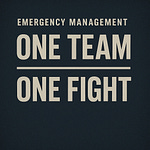
Why do you serve? What get’s you out of bed to do what you do? I want you to know that I appreciate you, not just your work; I appreciate you as an individual, as a person serving your community, and for your decision to better yourself and expand your ideas.
The question that I am asked often is why did I choose my profession? It is a question that is timeless, and on the surface, it seems simple. I have given easy answers in the past. I fell into it, or if I want to be philosophical, it is a calling; I want to give back to the community or serve the greater good. These are quick answers that take little thought. However, in our increasingly VUCA and rapidly changing world – what is the concept of the "greater good"? It is a philosophical idea rooted in making choices that benefit the majority, or the collective, instead of merely serving personal interests. This idea has permeated our societies, cultures, and governance systems for centuries and is more relevant now than ever.
Plato discussed the concept of the ‘greater good.’ In his view, a just society works toward the common good. This idea is explored in "The Republic," where he presents his vision of an ideal society.
Plato's philosophy revolves around 'justice' as a personal virtue and an underpinning principle of a good society. According to him, a just society is one where every individual fulfills their role to the best of their ability for the common good of everyone. In this context, the 'greater good' is society's overall harmony and well-being.
Today's objective is to explore the question: What is the greater good? How might we contribute to the benefit of all? How can we ensure that our actions are not solely self-serving but serve others more effectively? How can I discern whether providing more or possibly less of what my loved ones need could contribute to the larger common good? These inquiries, though seemingly straightforward, have profound implications. They serve as a compass, guiding our interactions with the world and shaping our perspectives on life.
Firstly, let's delve into the concept of 'intentionality.' Intentionality is a decisive element in pursuing the greater good. Conscious motivation guides our actions, inspiring us to think beyond our immediate desires and individual gains. Intentionality enables us to examine the broader consequences of our decisions, considering how they impact us and resonate within the wider community.
Each of us, as individuals, can contribute significantly to the greater good in a multitude of ways: through our professional endeavors, our volunteer work, acts of kindness and compassion, or through the choices we make as consumers and as active participants in a democratic society. The point of departure for all these actions is the intention to serve others and the broader community, not just our interests.
Now, it's essential to dispel the notion that contributing to the greater good requires monumental efforts or grand gestures. Quite the contrary, minor actions can create ripples, effecting change far beyond what we might anticipate. A gentle word of encouragement, a small act of compassion, taking a moment to truly understand someone else's viewpoint – these seemingly insignificant actions can contribute enormously to the greater good.
Navigating our interactions with people, we should consistently ask ourselves: "Can I give them more or less of what they need for the greater good?" This question is not about blindly fulfilling others' needs. Instead, it compels us to understand what truly benefits them in the long run and society.
Sometimes, giving more might create a cycle of dependency, and it would be more beneficial to provide less to encourage self-reliance and personal growth. Conversely, there are situations where giving more time, understanding, and empathy could be the key to fostering greater well-being. The underlying principle is that we need to know and understand others deeply, empathize with their circumstances, and make choices that ultimately promote the collective good.
Now I want to talk directly to the emergency management professionals.
As an emergency manager working in public service, your daily work is already oriented towards the common good, helping to safeguard lives and communities in times of crisis. Yet, there are more ways to expand your contribution. For instance, you can use your expertise to educate the public on disaster preparedness, helping individuals, families, and communities to become more resilient. Engaging in community events, schools, and local gatherings to discuss emergency planning can be a significant step. You can also advocate for policies prioritizing disaster risk reduction, public safety, and sustainable rebuilding efforts. Be active in your local, state and national emergency management organizations.
In your role as an emergency manager, your primary task is to serve your community, particularly during times of disaster. However, you can enhance your impact by constantly seeking to learn, improve, and adapt. This might involve further training, attending relevant workshops and conferences, or seeking feedback from those you serve to identify areas for improvement. Moreover, you can ensure your work serves others by promoting inclusivity, ensuring vulnerable populations have access to services, and implementing equitable disaster response and recovery strategies.
Now we need to discuss the work-life balance. This question is particularly poignant for public servants who often face the challenge of balancing their personal lives with the demands of their roles. Open communication with your loved ones about your role and its demands is essential to ensure your actions contribute to the larger good. Empowering them with knowledge about emergency preparedness can help them feel more secure and turn them into advocates within their networks. Remember that taking care of your well-being is crucial to perform your role effectively. Thus, understanding when to step back, delegate, and allow others to take charge benefits you and your loved ones and serves the community by ensuring you can perform optimally when needed.
Working towards the greater good is an outlook, a daily conscious choice. It involves selflessness, empathy, and a deep concern for the community and the world at large. It may not always be the path of least resistance and might often demand sacrifices. Still, it is a journey that culminates in a more prosperous, interconnected, and compassionate world.
We all possess an incredible ability to inspire change. Every decision we make, and every action we undertake, can contribute to the greater good. But it starts with introspection, posing challenging questions to ourselves and making a commitment to live intentionally, with consideration for the broader community and the world.
In summary, pursuing the greater good is an active, intentional process. It involves transcending our needs and desires to contemplate how our actions can best serve society. Doing so enriches our lives and contributes to a better world for everyone. Regardless of how insignificant our actions may seem, each of us has the power to make a difference. It merely requires the resolve to act, give, and serve—not just for personal gratification but for the benefit of all.
Thank you all for your time today, and I hope these words inspire you to reflect upon how you serve the greater good in your daily lives. The world needs more individuals ready to make this commitment, ready to make a difference, and your contribution, no matter how small, is essential.













Share this post